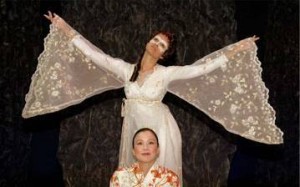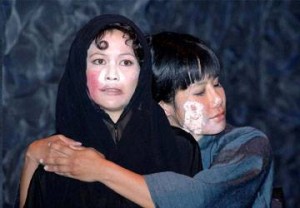
Beauty is at the heart of Velina Hasu Houston’s new play Calling Aphrodite,
currently having its world premiere production at Long Beach’s International
City Theatre. Beauty as something divine, beauty as a thing to be envied,
beauty as something destroyed by war, beauty as a sign of hope.
Keiko and Shizuka are sisters in Hiroshima in 1945. Keiko is the beautiful one, off
to Nagoya to care for her wounded lover Sato, “the one beautiful thing left” in
this country made ugly by war. Shizuka, her jealous sister, prevents her from
leaving Hiroshima, and the bomb falls. Ten years later, an American doctor
arrives in Japan as part of the “Hiroshima Maidens” project, offering surgery in
America as hope to 25 young Japanese women burdened by scars on their
faces and hands bent into claws. Among them, only Keiko, whose love for the
West has turned to hate and whose faith in Aphrodite, the goddess of beauty
has been shattered, refuses to go.
This is the story of Calling Aphrodite, now being given exquisite Class A
treatment in a fine production directed with grace and sensitivity by Shashin
Desai. Working with playwright Houston, a superb cast, and an extraordinary
design team, Desai’s production is one of ICT’s best.
As Keiko, Kim Hoy (so wonderful in East West Players Little Shop of Horrors a few
years back) is all delicacy and femininity until her facial and body scars sour her
to life. Hoy’s transition from a young girl for whom beauty is a way of being to
embittered bomb victim is heart-wrenching. “Why all these surgeries to make it
look as if the bomb never fell?” she cries out to the doctor who has come with
the best of intentions.
Vivian Bang does equally good work as Keiko’s envious sister, whose sarcastic
wisecracks end when her beautiful sister is made ugly by the bomb.
Shakespeare vet Barry Lynch is Dr. Everett, the plastic surgeon who seeks an
end to his own war damage and bitterness by performing acts of compassion.
It is a rich and moving performance. Blake Kushi does very good work as his
Japanese counterpart, Dr. Matsubayashi.
Finally there is Brenda Hattingh as the goddess Aphrodite, or as the
“Aphrodite” that Keiko imagines and talks with in her mind. Speaking in a high
pitched melodious voice (the way Keiko would hear her I suppose), the lovely
Hattingh dispenses words of wisdom, serving as a kind of guardian angel
throughout the play and as a symbol of what Keiko has lost. “Why didn’t you
save me from the American bomb,” Keiko cries out at one moment.
As fine as are Houston’s writing, Desai’s direction, and the cast’s performances,
the extraordinary work of ICT’s design team makes an equally strong
impression. Set designer Don Llewellyn has fashioned an exquisite backdrop of
shimmering drapes, which seem to have a life of their own as lit by the brilliant
Jeremy Pivnick. Kim DeShazo’s Japanese costumes are equally fine. Best of all
is the amazing sound design of Glen A. Dunzweiler, a new name for me, but
one I’ll be remembering. Taiko drums, sirens, a flute, birds, a lute, circling
bombers, falling bombs, and wailing grief-stricken voices surround the
audience, adding greatly to the play’s impact. Award worthy work.
Ultimately, Calling Aphrodite is that best of historical plays, one which
educates, illuminates, and moves…deeply. Kudos to all involved in this
gorgeous production.
International City Theatre, 300 E. Ocean Boulevard, Long Beach.
www.ictlongbeach.org
–Steven Stanley
September 1, 2007




 Since 2007, Steven Stanley's StageSceneLA.com has spotlighted the best in Southern California theater via reviews, interviews, and its annual StageSceneLA Scenies.
Since 2007, Steven Stanley's StageSceneLA.com has spotlighted the best in Southern California theater via reviews, interviews, and its annual StageSceneLA Scenies.







 COPYRIGHT 2024 STEVEN STANLEY :: DESIGN BY
COPYRIGHT 2024 STEVEN STANLEY :: DESIGN BY